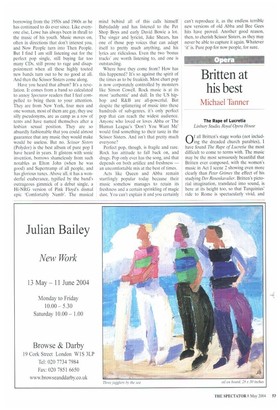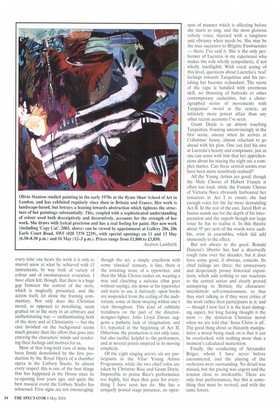Britten at his best
Michael Tanner
The Rape of Lucretia Linbury Studio, Royal Opera House
Qf all Britten's stage works (not including the dreaded church parables), I have found The Rape of Lucretia the most difficult to come to terms with. The music may be the most sensuously beautiful that Britten ever composed, with the women's music in Act I scene 2 showing even more clearly than Peter Grimes the effect of his studying Der Rosenkavalier. Britten's pictorial imagination, translated into sound, is here at its height too, so that Tarquinius' ride to Rome is spectacularly vivid, and
every time one hears the work it is only to marvel anew at what he achieved with 13 instruments, by way both of variety of colour and of onomatopoeic evocation. I have often felt, though, that there is a huge gap between the context of the story, which is magically presented, and the action itself, let alone the framing commentary. Not only does the Christian moral, as opposed to moralising, seem grafted on to the story in an arbitrary and unilluminating way — unilluminating both of the story and of Christianity — but the care lavished on the background seems much greater than the effort that goes into entering the characters' minds and rendering their feelings and motives for us.
Most of that long-held view of mine has been firmly demolished by the first production by the Royal Opera of a chamber opera in the Linbury Studio. In almost every respect this is one of the best things that has happened in the House since its re-opening four years ago, and quite the best musical event the Linbury Studio has witnessed. First signs are not encouraging: though the set, a simple cruciform with some 'classical' statuary, is fine, there is the irritating noise of a typewriter, and then the Male Chorus rushes on, wearing a mac and clutching a suitcase (that goes without saying), sits down at his typewriter and starts to use it furiously; open books are suspended from the ceiling of the auditorium, some of them swaying within one's view throughout. This kind of rubbishy trendiness on the part of the directordesigner-lighter John Lloyd Davies suggests a pathetic lack of imagination, and it's repeated at the beginning of Act II. Otherwise the production is not only sane, but also tactful, helpful to the performers, and at several points inspired in its moving simplicity.
Of the eight singing actors, six are participants in the Vilar Young Artists Programme, while the two chief roles are taken by Christine Rice and Grant Doyle. Impossible to praise Rice's performance too highly, but then that goes for everything I have seen her do. She has a uniquely poised stage presence, an open
ness of manner which is affecting before she starts to sing, and the most glorious velvety voice, injected with a tanginess and vibrancy when needs be. She may be the true successor to Brigitte Fassbaender — there, I've said it. She is the only performer of Lucretia in my experience who makes the role wholly sympathetic, if not wholly intelligible With vocal acting of this level, questions about Lucretia's 'real' feelings towards Tarquinius and his ravishing her become redundant. The scene of the rape is handled with enormous skill, no thrusting of buttocks or other contemporary audacities, but a choreographed series of movements with Tarquinius' sword at the centre, an infinitely more potent affair than any other recent accounts I've seen.
Grant Doyle is an almost touching Tarquinius, boasting unconvincingly in the first scene, uneasy when he arrives at Collatinus' house, almost reluctant to go ahead with his plan. One can feel his awe at Lucretia's beauty and composure, just as one can sense with him that her apprehensions about his staying the night are a complex matter. Can these central scenes ever have been more sensitively realised?
All the Young Artists are good, though the Male Chorus of Hubert Francis is often too loud, while the Female Chorus of Victoria Nava obviously harboured her resources in Act I to ensure she had enough voice for the far more demanding Act II. In the rest of the cast, Jared Holt as Junius stands out for the depth of his interpretation and the superb though not large voice he has to realise it. In this theatre about 95 per cent of the words were audible, even in ensembles, which did add immensely to the effect.
But not always to the good. Ronald Duncan's libretto has had a deservedly tough time over the decades, but it does have some good, if obvious, conceits. Its chief failings are three: the unnecessary and desperately prosey historical expositions, which add nothing to our reactions to the central action and clearly proved uninspiring to Britten; the characters' intermittent self-consciousness, so that they start talking as if they were critics of the work rather than participants in it; and — though I now feel it is the least damaging aspect, for long having thought it the most — the slotted-in Christian moral when we are told that 'Jesus Christ is all'. The good thing about so blatantly manipulative a moral being stuck on is that it can be overlooked, with nothing more than a moment's calculated inattention.
Finally, the conducting of Alexander Briger, whom I have never before encountered, and the playing of the orchestra were outstanding. No detail was missed, but the pacing was urgent and the tension close to intolerable. There are only four performances, but this is something that must be revived, and with the same forces.













































































 Previous page
Previous page